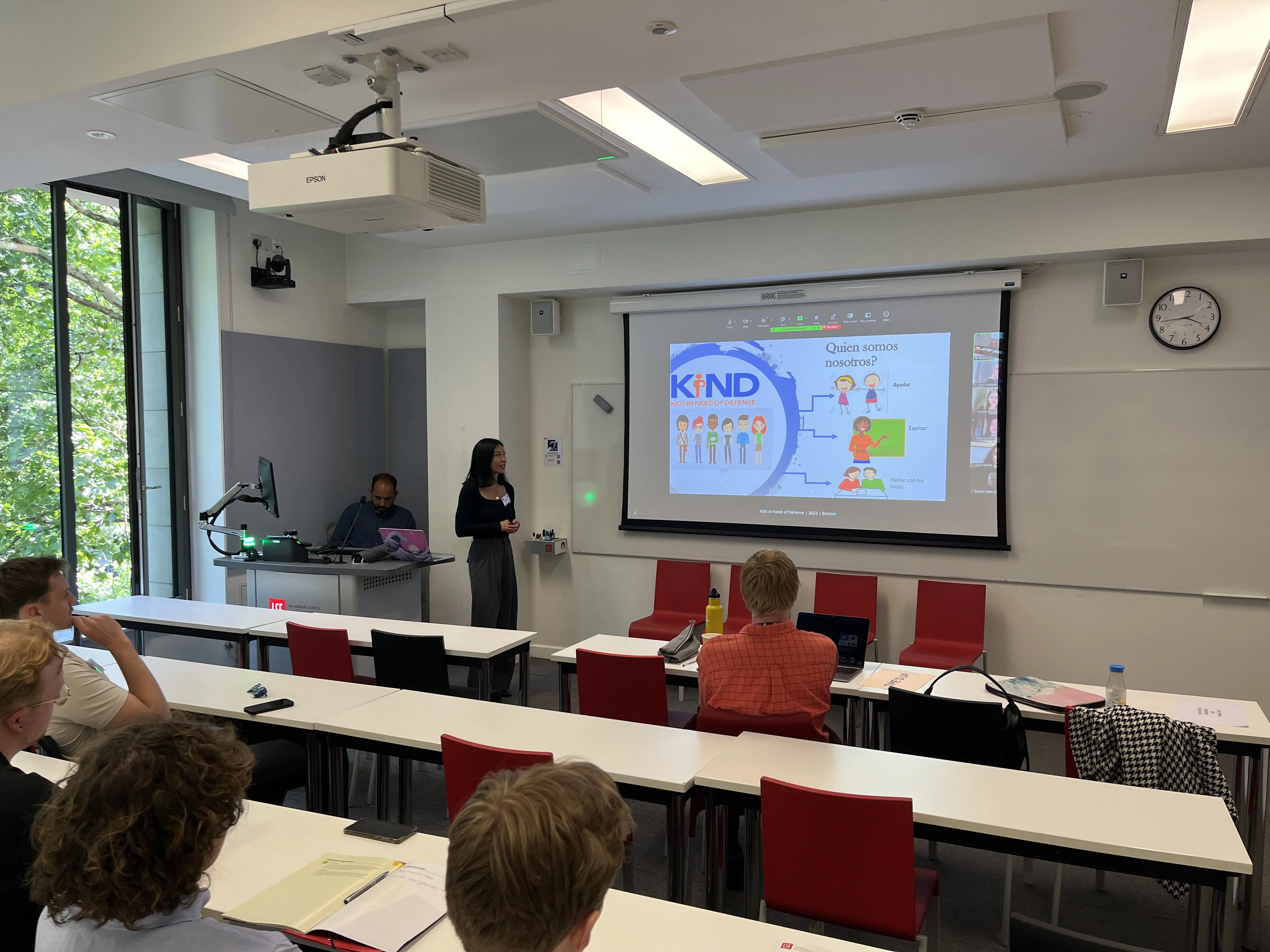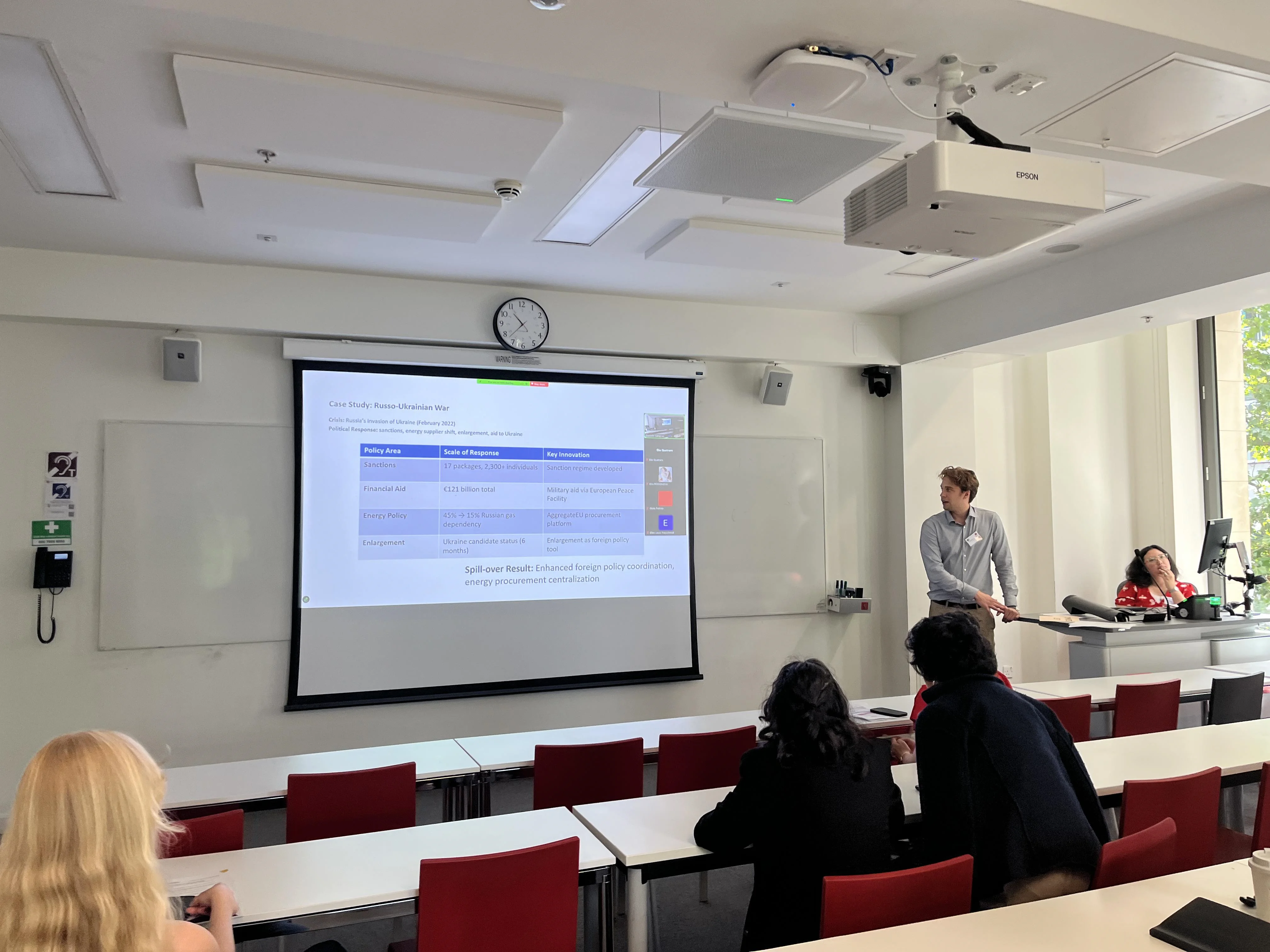The European Institute's research community comes together at the LSE Festival 2025
From our faculty to our students and alumni, the European Institute’s intergenerational community presented its latest research at the 2025 edition of the LSE Festival, including the LSE Festival Exibition: Visions for the Future and Knowledge Beyond Boundaries: LSE's Interdisciplinary Student Research Conference. We invite you to discover our academic community's research below.

LSE Festival Exhibition: Visions for the Future
16-21 June 2025What will our futures look like? Featuring research from across the social sciences, this year’s LSE Festival exhibition explored the people and communities, innovative technologies, challenges of today, and lessons from the past that are shaping the world to come.

The impact of climate-based natural disasters
by Dr António Valentim
Assistant Professor in European Politics
Dr António Valentim is an Assistant Professor in European Politics and Policy at the European Institute. He studies comparative and environmental politics, focusing on political behaviour and political elites in established democracies. His work has been published or conditionally accepted at the American Journal of Political Science, British Journal of Political Science and Nature Climate Change.
As climate change accelerates, its consequences become more apparent. Yet, how do political actors and institutions respond when the crisis hits their doorstep? And when they don’t, can citizens shift the needle?
Dr Valentim’s research on the impact of extreme weather events on voting behaviour was displayed as part of the LSE Festival Exhibition from Monday 16 until Saturday 21 June in the Great Hall of the Marshall Building. His research explores the potential impact of natural disasters and related protests on individuals’ political preferences, and on the behaviour of political parties in Europe and Brazil.
You can browse the wall closely and listen to the audio commentary. Dr António Valentim has also summarised the insights from his four studies which explore different stages of political response to climate change – from elite (in)action to party responsiveness and grassroots mobilisation - for the EUROPP Blog.
Read on the EUROPP Blog
Knowledge Beyond Boundaries: LSE's Interdisciplinary Student Research Conference
17 June 2025Knowledge Beyond Boundaries, LSE's annual interdisciplinary student research conference, took place as part of the LSE Festival on Tuesday 17 June 2025. This year, it drew upon the theme of "visions for the future": How will AI, new technologies and innovation shape our societies? How will we confront the global challenges of climate change and inequality?
Hosted by LSE100, the School's flagship interdisciplinary course, Knowledge Beyond Boundaries featured over 100 speakers speaking engaging with the conference theme, all of whom are current LSE students, LSE alumni or students from our partner CIVICA institutions. The conference programme also proudly featured several panels and a reception hosted in partnership with the LSE Global School of Sustainability.

Between growth and depletion: governing water in tourism reliant island economies
by Ellie Fischer
MSc European and International Politics and Policy (Class of 2025)
Ellie Fischer is an MSc student in European and International Politics and Policy at the European Institute. With work experience in corporate sustainability, her interests centre on the governance of climate action, the regulatory frameworks shaping it, and the livelihoods it impacts.
Ellie presented her Applied Policy Project, surpervised by António Valentim, in the session exploring "Climate Futures: Negotiating Climate Justice," which was hosted in partnership with the LSE GLobal School of Sustainability. Her project focused on toursim-reliant island economies in Greece and the mounting pressures they face due to water scarcity.
Abstract:
"The project examines a pressing governance challenge seen in many tourist regions worldwide: while tourism has long driven local economic growth and sustained livelihoods, it has regrettablybeen built on fragile foundations — economic models that overlook ecological thresholds and overexploit critical natural resources, particularly water. As climate change accelerates and water becomes scarcer, the vulnerabilities of these models are becoming increasingly visible. In some regions, tourism accounts for over 90% of local GDP, yet the very resource it depends on is now under strain. This raises difficult — and urgent — questions: Who should have priority access to limited water resources — seasonal tourists or local residents? These questions have become central in public debates and actionable policy solutions are now required to ensure the resilience and sustainability of both the economy and the communities that depend on it.
The project draws on interviews with a wide range of stakeholders — from civil servants and government officials to business owners and residents — to better understand the policy trade-offs and propose actionable recommendations. It’s a complex, still-unfolding issue, but one that’s rapidly gaining attention, both in Greek national media and internationally, as new regulations and governance frameworks are being explored.”
Watch the session recording
Investigating global policy dynamics and obstacles: abolishing detention for migrant children
by Jennifer Belardo
MSc International Migration and Public Policy (Class of 2025)
Jennifer Belardo is part of the MSc International Migration and Public Policy programme at the European Institute. Following her BA at Northeastern University, she worked at the International Rescue Committee in San Diego, in microfinance. Then, at Kids in Need of Defense, she facilitated legal services for 5-12 year old detained unaccompanied migrant boys.
Drawing on her experience working at the Kids in Need of Defense in the United States, Jennifer presented her dissertation, supervised by Eiko Thielemann, in the session entitled "Futures Beyond Borders: Migration & Sovereignty". Her dissertation investigates the global policy dynamics regarding banning the detention of migrant children.
Abstract:
"Despite the human rights consensus that detaining children based on their immigration status violates children's rights as outlined in the United Nations Convention on the Rights of the Child, policy in practice continues to fall short of passing legally binding protections. Reform in this field seem to be a distant hope as laws in the United States, the European Union, and Australia continue to allow for detaining migrant children for administrative purposes, during arrival or deportation. My research raised various concerns for the human rights movements in civil society - the limited legitimacy of international organizations - and the increasing polarization of immigration politics - can children ever be separated from their migrant identity or will they always suffer from the securitisation framing and be dehumanised as criminals in the eyes of their receiving nations?
I consider the specific issues of unaccompanied minors, alternatives to detention, and the policy changes required to safeguard children's rights. My research analyses policy in the US and EU and includes interviews from a range of actors in the field to better understand the reality and limitations of the movement to end migrant children detention. Overall, this research explores the theories, debates, and political dynamics which drive policy for all migrant children to better understand the strategies and initiatives to reform policy and improve the migration experiences of migrant children."
Watch the session recording
A critical realist analysis of EU integration spill-over: how do political responses to crises influence the makeup of integration?
by Gabriel A. Pierzynski
MSc European and International Public Policy (Class of 2024)
Gabriel A. Pierzynski is a recent alumnus from the MSc in European and International Public Policy at the European Institute. Upon graduation, he went on to complete a Blue Book Traineeship at the European Commission and currently works as a Research Assistant at the Hellenic Observatory within the European Institute. He works with Professor Vassilis Monastiriotis on a project using AI-assisted qualitative analysis to examine the drivers of ‘regional growth accelerations’ in Europe. He is also involved on work looking at national industrial policies in small and peripheral European member states, as part of the work of the Hellenic Observatory on the topic.
Gabriel presented his Applied Policy Project in the session on "Power, Media & Democracy". In his project, Gabriel explored the following research question: "How do political responses to crises cause EU integration spill-over?" To do so, he sought to go beyond existing theories of European integration in the literature and applied a critical realist lens to the case study of Russia's invasion of Ukraine in February 2022, from which he drew conclusions about crisis-driven EU integration spill-over more broadly.
Watch the session recording